Home>North America>Life of AB Gregory
Chapter 34: The Emergence of Cyprian of Fili
Church life in the Russian Church Abroad continued peacefully as in all previous years. Metropolitan Philaret had reposed and a new hierarch, Metropolitan Vitaly, was initially leading the Church in the same tradition as his predecessors.
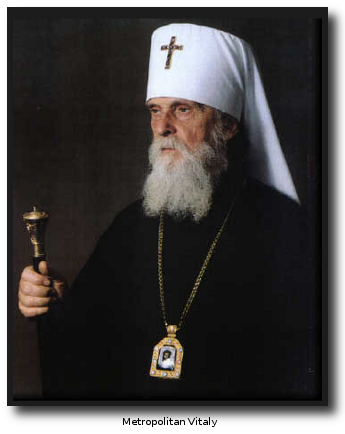
Despite statements from him at times that were inconsistent, never was the whole Synod deceived in any way until 1992. About this time the deposed clergyman Cyprian of Fili and his heretical Synod attempted to seduce the Russian Church Abroad by entering into liturgical communion with them. This attempt was initiated by the Cyprianite Bishop of Bulgaria, Fotios, through his contact with the more liberal members of the Russian Church Abroad. He was inciting them to go into communion, not at first with Cyprian himself, but with the Romanian bishops with whom Cyprian was in communion.
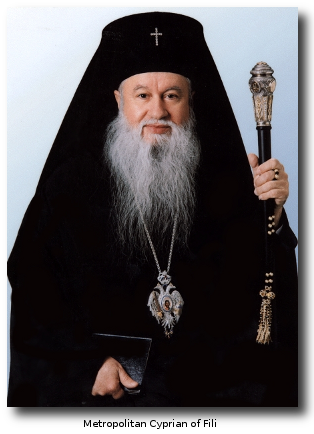
The heretical teaching of the Cyprianites is essentially the fact that they believe and teach that the Holy Spirit, the grace of God, abides in the mysteries of heretics. This blasphemous teaching was initially written by Augustine of Hippo, but had been rejected by the Orthodox Church through its councils and canons.
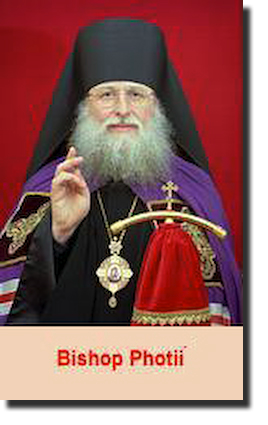
The efforts of this deceptive Bishop Fotios succeeded in 1992 when the Russian Church Abroad officially went in communion with the Romanian old calendar group associated with Cyprian. These Romanian bishops, paradoxically as it may be, were in communion with Cyprian and at the same time did not espouse his heretical teaching that the new calendar Romanians had grace. Father Gregory was the only clergyman of the Russian Church Abroad who objected, but he did not do this in writing, but only through phone calls to the Russian bishops. Archbishop Anthony of Los Angeles told Fr. Gregory that he was not impressed with the Romanian bishops and frankly admitted that our Russian bishops knew very little about them. There was also no official statement from the Russian Synod that the ecclesiology of these bishops was identical to their own, but the fact that they went into communion with them implied the same thing. Father Gregory decided to wait and see what the outcome of this union would be, since no one broke communion with the Russian Church Abroad, nor even protested, neither the Greek Old Calendarist Florinite Synod, nor the other more conservative bishops of the Russian Synod.
One year later movement started towards ecclesiastical communion with the father of this heresy, Cyprian himself, and his group in Greece. Now the insidious plot was being revealed. Father Gregory wasted no time in writing letters to some bishops to inform them of the teaching of Cyprian and the fact that he was deposed by the bishops who ordained him in Greece, who were in communion with the Russian Church as well. Bishop Fotios of Bulgaria used the argument that since the Russians were in communion with the Cyprianite Romanians, there was no reason why they should not be in communion with Cyprian himself! Fr. Gregory‘s opinions were widely disseminated because of his open letters, but the likelihood of this union was still unknown.
Behind the scenes Fr. Gregory could not tell the maneuvers that were happening. The approaching glorification of St. John Maximovitch in July of 1994 saw a tremendous movement on the part of the Cyprianites to accomplish this union during this event in San Francisco. They even presented themselves there during the services. Father Gregory asked Metropolitan Vitaly who invited them, but he did not know. During the vigil service for the glorification, Metropolitan Cyprian himself in the company of a few of his bishops approached Metropolitan Vitaly in the sanctuary and offered him gifts from Greece. It was a set of very expensive enkolpion and cross. They talked for about five minutes with an interpreter and then Cyprian and all his bishops abruptly departed out of the sanctuary and out of the church. Father Gregory then approached Metropolitan Vitaly and asked him quietly what happened. Metropolitan Vitaly said, “He asked for recognition, and I asked him how could I recognize him without consulting the other Greek Synod with whom we are in communion? After I said that, he just left quite displeased.” Father Gregory breathed a sigh of relief and actually thought that the union was dead.
During the festivities the next day there were no Cyprianite bishops or priests present. After the glorification a synodal meeting took place. In this gathering the Cyprianite bishops made their impassioned petition for union with the Russian Church Abroad. Father Gregory did not know exactly what transpired in the meeting, but afterwards Metropolitan Vitaly told him that the union was put to a vote and that he was the only one opposed. He said, “If I were the only one opposed, I did not want to act like a dictator or pope.” So he let the union pass. However, he told Fr. Gregory that there was no concelebration whatsoever, and that there would be no concelebration, “so please do not leave! If the first hierarchs do not concelebrate, how can there be a union?”, he asked. Fr. Gregory then contacted Archbishop Anthony of Los Angeles to ask him what exactly happened in the synodal meeting. He told Fr. Gregory that the union with Cyprian was put to vote by the liberal bishops and that he, Archbishop Anthony, was the only vote opposed to it. Father Gregory told him that Metropolitan Vitaly said he was the only vote opposed to it, to which Archbishop Anthony was amazed and said that it was not true.
Regardless of what happened during the synodal meeting, the outcome was a union with the deposed heretic Metropolitan Cyprian. Father Gregory then began to write open letters in an attempt to correct this drastic mistake. He sent these letters to every bishop, priest and deacon in the Russian Church Abroad all over the world. In this way Fr. Gregory sought to expose the blasphemous teaching of this heretic. What was the outcome? After the third open letter, Fr. Gregory received a directive from Archbishop Alypy stating that if he did not stop writing and protesting this union that he would be suspended from the priesthood!
Other happenings behind the scenes were quite notable. When the Greek Old Calendarist Synod under Archbishop Chrysostom heard that the Russian Church Abroad joined with this leader of heresy whom they had deposed, they broke communion with the Russian Church Abroad for the first time in their history. First, however, they sent Cyprian‘s deposition papers to the Russian Synod meeting in Lesna, France, but they received no reply. The Greek Old Calendar Church had received its episcopacy from the Russian Church Abroad in 1961 and had always been in communion with her. Also about this time Bishop Gregory Grabbe wrote his famous open letter stating that the Russian Church, by entering into communion with Cyprian, had fallen underneath its own Anathema against Ecumenism of 1983.
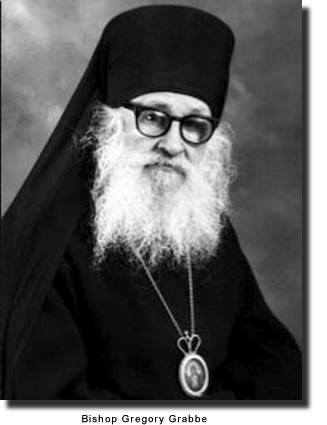
Lastly, the bishops in Russia who were ordained by the Russian Church Abroad were also protesting this intercommunion with Cyprian. Eventually they separated from the Russian Church Abroad and declared their independence because of this and other canonical irregularities. It should also be noted that during the glorification of St. John Maximovitch, no miracles were recorded. Many saw this as a sign from God, that such a great wonderworker who filled the world with many miracles, was displeased with the Cyprianite union, and this displeasure was manifest by a complete absence of miracles at his glorification.
Father Gregory and his monastery remained with the Russian Church Abroad because Metropolitan Vitaly told him the union should not be considered complete if there was never any concelebration among the first hierarchs. This condition remained until December of 1995 when, despite all the warnings that were given him, Metropolitan Vitaly, on the feast of the Mother of God of the Sign, in New York City, concelebrated the Divine Liturgy for the first time with the deposed Ecumenist Metropolitan Cyprian of Fili. Reports from those present at that Liturgy stated that the chalice had spilt some of the consecrated gifts on the antimension! When Fr. Gregory confirmed that there was indeed a concelebration, he decided it was now time to leave the Russian Church Abroad. All those with him supported him in this decision. He notified Archbishop Alypy, his diocesan bishop, that he had to leave the Russian Church Abroad, because he did not want to be in communion in any way with this heretic. Archbishop Alypy understood very well and told him that he could leave. Archbishop Anthony of Los Angeles was going to confession to Fr. Gregory, so he had to notify him also.
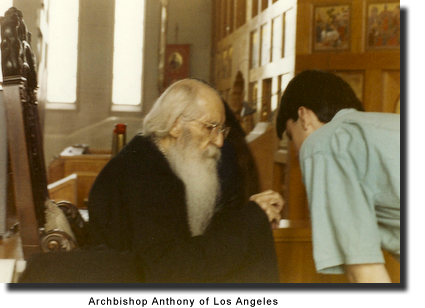
Archbishop Anthony understood, and told him that he could not follow him at the present time. What was the outcome of this unhappy affair with the heretic Cyprian of Fili? The outcome was that Metropolitan Vitaly destroyed the Russian Church Abroad, and actually fulfilled the little-known prophecy of Archbishop Andrew of Spring Valley, New York, who said that, “If Archbishop Vitaly ever becomes Metropolitan, he would destroy the Russian Church Abroad.” His communion with this “Synod of Resisters” under Cyprian, ushered in the Russian Church Abroad‘s eventual union with the Moscow Patriarchate and all of World Orthodoxy espousing Ecumenism. Eight years later Metropolitan Vitaly himself broke communion with Cyprian and finally acknowledged that his theology is heretical. In 2001 Metropolitan Vitaly stated that the teaching of Cyprian falls under the Russian Church Abroad‘s Anathema of 1983. As of the writing of this life, in 2010, the end of Cyprian of Fili has shown the world that he is exhibiting the death of a heresiarch, by the fact that he has been in a coma for five years, with his eyes and mouth open and his heart still beating.
|
Archbishop Gregory Dormition Skete P.O. Box 3177 Buena Vista, CO 81211-3177 USA |

|
|
|
Copyright 2011 - Archbishop Gregory Last Updated: July 12, 2011 |
